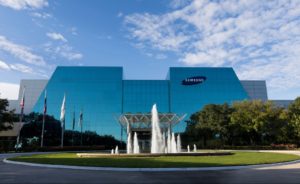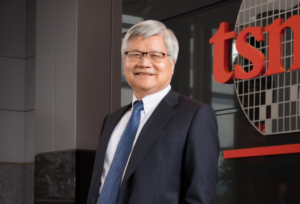
EDACafe Editorial Roberto Frazzoli
Roberto Frazzoli is a contributing editor to EDACafe. His interests as a technology journalist focus on the semiconductor ecosystem in all its aspects. Roberto started covering electronics in 1987. His weekly contribution to EDACafe started in early 2019. Chip lead times; Samsung EUV lines in Austin; Google 3D videoconferencing; data-driven algorithm designMay 20th, 2021 by Roberto Frazzoli
Chip shortage and new fab plans continue to be hot topics this week, while there is no shortage of AI news – with Google announcing the next generation of TPUs, and Edge Impulse expressing an interesting concept about machine learning bound to replace code writing in algorithm design. Chip lead times reach 17 weeks According to a research by Susquehanna Financial Group, quoted by Bloomberg, chip lead times – the gap between order and delivery – increased to 17 weeks in April. That is the longest wait since the firm began tracking the data in 2017. Specific product categories reported even longer lead times: 23.7 weeks in April for power management chips, about four weeks more than a month earlier; industrial microcontrollers also showed a worsened situation, with order lead times extended by three weeks. Automotive chip supply continues to be a pain point, with NXP reportedly having lead times of more than 22 weeks now – up from around 12 weeks late last year – and STMicroelectronics to more than 28 weeks. This situation is raising concerns of ‘panic ordering’ that may lead to market distortions in the future.
Samsung Electronics to build 5nm EUV-equipped foundry lines in Austin Hopes are being placed on the expected increase in global chip production capacity, as foundries and IDMs keep announcing new fabs. According to South Korean publication ‘Electronic Times’, Samsung Electronics has decided to build 5-nanometer EUV-equipped foundry lines in Austin, Texas, investing $18 billion in the construction. These would be the first Samsung EUV production lines in a country other than South Korea. Reportedly, the company plans to break ground this third quarter and start the operation in 2024. An official announcement is expected around May 21, when South Korean President Moon and U.S. President Biden are scheduled to have their first summit in Washington D.C. The new lines would expand Samsung presence in Austin, where the South Korean firm established a fab in 1996. Google’s TPU v4, 3D-videoconferencing and other announcements from I/O event Google resumed its “I/O” Developers Conference this year, although still in a restricted format. As usual, the event was used by the company to announce several new products or product upgrades. Among them, an AI-powered capability in Google Maps to identify safer roads, based on weather and traffic conditions where vehicles are likely to brake suddenly; a new ‘smart canvas’ experience in Google Workspace to enable richer collaboration; a new AI-based language model for natural language understanding in dialogue applications, called LaMDA, designed to converse on any topic; the opening of a new state of the art Quantum AI campus in Santa Barbara, California, with Google’s first quantum data center and quantum processor chip fabrication facilities. Google also announced the next generation of TPUs, the TPU v4, powered by the v4 chip which is more than twice as fast as the previous generation. One pod can deliver more than one exaflop, and Google data centers will soon have dozens of TPUv4 pods – which will be available to Cloud customers later this year. Long-term research initiatives include a 3D-videoconferencing system called Project Starline. Using high-resolution cameras and custom-built depth sensors, the system captures a person’s shape and appearance from multiple perspectives, and then fuses them together to create an extremely detailed, real-time 3D model. The resulting data is many gigabits per second, so Google developed novel compression and streaming algorithms that reduce the data by a factor of more than 100. Researchers also developed an innovative light-field display. A sample of the resulting user experience is shown in this video. Ampere announces big customers and a new chip Ampere Computing, a Santa Clara, CA-based processor startup aiming at the server market, has reportedly said it has signed up big customers for its Altra chip including Microsoft Azure, Tencent Cloud, and TikTok’s Chinese parent company ByteDance. Beginning next year, Ampere will offer a new 5-nanometer chip that features processor cores designed in house, replacing Arm cores but retaining software compatibility. Edge Impulse raises $15m Series A funding to fuel data-driven algorithm design Edge Impulse (San Jose, CA), provider of a leading machine learning development platform for edge compute, has announced the closing of a $15m Series A investment round led by Canaan Partners. On occasion of this announcement, Edge Impulse co-founder Zach Shelby explained his concept of ‘data-driven engineering revolution’. “In the past we have misunderstood the power of machine learning, by focusing on artificial intelligence as the product,” he wrote in a blog post. “The big news isn’t about the latest YOLO or GPT model. The real game changer is that machine learning enables us to use custom, industry specific data to drive the design of complex algorithms, new features and personalized behavior that all developers and engineers will make use of across all industries in the coming years. (…) Instead of coding by trial and error, we choose appropriate feature extraction and train an ML algorithm using our dataset. Instead of hand-crafted unit testing, we use data to test the result. To improve a machine learning algorithm, the vast majority of time and effort will go into extending or improving the dataset.” Acquisitions Ansys has acquired Phoenix Integration (Blacksburg, VA), a major provider of software for model-based engineering (MBE) and model-based systems engineering (MBSE). The acquisition will enable Ansys users to connect a range of engineering tools together in multi-tool workflows for model-based engineering. STMicroelectronics has announced a transaction with French AI software company Cartesiam to acquire its assets (including its IP portfolio) and to transfer and integrate its employees. Cartesiam specializes in AI development tools for Arm-based microcontrollers. STMicroelectronics plans to offer Cartesiam’s flagship solution, NanoEdge AI Studio, for the development of applications based on its STM32 microcontrollers. Upcoming virtual events The 2021 TSMC Technology Symposiums are scheduled for June 1 (North America) and June 2 (China, Europe, and Taiwan). Both events will feature a keynote from TSMC CEO, C.C. Wei. A partner pavilion will host virtual booths from TSMC partner companies. |
|
|
|||||
|
|
|||||
|
|||||









